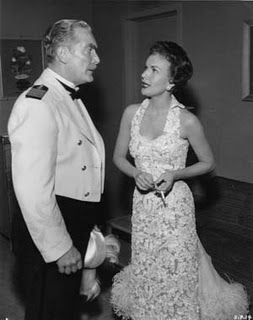 |
| Roy Roberts and Gale Storm |
THE GALE STORM SHOW [OH SUSANNA!] 1956 - 1960.
After
My Little Margie wrapped up its run, star Gale Storm wasn't especially interested in doing another series, but she was talked into this one, probably because of its simplicity and unlimited potential for story ideas. In this Storm plays Susanna Pomeroy, the social director on a cruise ship. Susanna was basically Margie grown up. Storm had just started a recording career around this time, so she sang at least one number in most of the episodes. Her roommate and best friend was Elvira "Nugie" Nugent (
Zazu Pitts), who ran the beauty parlor on board, but the main "relationship" in the show was the love/hate one she had with her boss, Captain Huxley (Roy Roberts). Adversaries from the first, they eventually developed a grudging fondness for each other. British actor James Fairfax was another regular for about half the episodes as the stewart, Cedric. Storm could overact, trying too hard for a laugh -- she was certainly no
Lucille Ball or
Joan Davis -- but she was still a funny, gifted performer and she had a nice singing voice. In her memoirs, Storm admitted that more people remembered her in
Margie than in this show, and maybe the former was "funnier," but
The Gale Storm Show had its moments and was in general a very pleasant series. [Apparently the exact title was "The Gale Storm Show: Oh Susanna" and only "Oh Susanna" was used in syndication, but who knows?] Roberts made a perfect foil for Storm, and Pitts was her usual adept and dithery self.
Even when the show wasn't a laugh riot, the stories often held the attention in spite of it. Still, most of the episodes I've seen [about 80 out of 125] never rise above a B+ level. The very few "A" episodes include: "For Money or Love," in which Susanna gets a rich guy on the rebound; "It's Murder, My Dear," which guest-stars a wonderful
Boris Karloff [during his tenure on
The Veil anthology series] in a dual role; "The Parisian Touch," with some funny tomfoolery over an allegedly valuable painting [with
Elvia Allman and
Vincent Padula]; and "Singapore Fling," in which a talking mynah bird who says bad things about the captain nearly gets Susanna into hot water;
Keye Luke guest-stars. Other memorable episodes include "The Chimpanzee," which features a talented and adorable chimp; "Model Apartment" [Susanna sub-lets, to her regret]; "Love and Kisses" [love between a passenger and a stoker]; "It's Only Money" [Nugie thinks she's inherited a fortune]; "Super Snoop" [Susanna mistakes Nugie for a snitch]; "Heaven Sent" [the gals try to market a supposedly new perfume, with
Jacques Bergerac]; "The Magician" [who is also a kleptomaniac]; "Sweepstakes Ticket," in which
Dick Miller swipes a winning ticket from a deckhand; and "Card Sharp," which guest-stars
William Frawley and could have been sub-titled "Margie Meets Fred Mertz." Other guest-stars on the show included
Gene Nelson,
Percy Helton,
William Bishop,
Irving Bacon,
Margaret Hamilton,
Jay Novello,
Ken Clark [a Texas millionaire],
Anthony Dexter [gypsy king],
Steve Dunne,
King Donovan,
Edd Byrnes,
Jim Backus,
Joi Lansing,
Pat Boone, and
Jerome Cowan.
Although Susanna, Cedric and other crew members often reacted to the captain as if he were an ogre, he never seemed so worthy of their contempt, and frankly, his ire at "Miss Pomeroy" often seemed warranted, as she
was a screw-up. While Susanna's schemes were generally for positive reasons, in one episode she seems almost manically determined to expose a phony medium even though most sensible people will agree that anyone who sees a medium as anything other than entertainment deserves to be taken. In the show's final episode, "Show Biz," Jack Albertson plays a washed up vaudevillian. Unfortunately, nothing he does when he gets to perform displays the talent the character was supposed to possess [although Albertson himself is a fine actor].
The show lasted for four seasons.
Verdict: A good cast puts this over. ***.







 TRAUMA (1962). Writer/director: Robert Malcolm Young.
TRAUMA (1962). Writer/director: Robert Malcolm Young.
















